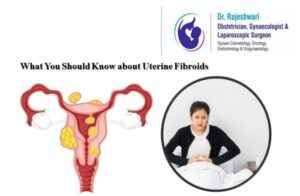Causes of menstrual irregularities
You may have irregular periods If you:
- See changes in the time gap between each period
- Notice less or more blood flow during a period than normal
- See a lot of variations in the number of days your period lasts.
- Bleeding in between cycles.
Menstrual cycle irregularities can have many different causes, including:
Polycystic ovary syndrome (PCOS)
The most common sign of PCOS is irregular periods. This is an endocrine system disorder. The ovaries are enlarged with plenty of follicles. When androgens (male sex hormones) levels increase in women, as seen in this condition, ovulation stops resulting in irregular periods. Learn more about “Polycystic Ovarian Syndrome”
Uterine fibroids
Uterine fibroids are nowadays a common finding in many women of reproductive age. These are noncancerous growths in the uterus. The size of fibroids varies. Fibroids can cause painful, heavy, and prolonged menstrual periods. Learn more about “Uterine Fibroids”
Pregnancy or breast-feeding
If you have missed a period, it is a pregnancy sign. If you breastfeed, the return of menstruation after pregnancy may typically get delayed. The other signs of pregnancy include morning sickness, nausea, vomiting, breast tenderness, aversion to smells, fatigue, and bloating sensation.
Pelvic inflammatory disease (PID)
It is an infection of the female reproductive organs caused by sexually transmitted infections. It can cause irregular menstrual bleeding and spotting in women. Learn more about “Pelvic Inflammatory Disease”
Endometriosis
Irregular menses with significant pain is the most prominent sign of endometriosis. Nearly 1 in 10 women of reproductive age may develop this condition. The other symptoms of endometriosis include bleeding between periods, long periods, heavy bleeding, and pain during and after sexual intercourse.
Learn more about “Endometriosis”
Adenomyosis
It is a condition wherein the endometrial glands are present in the muscular layer of the uterus which causes pain and excessive bleeding during cycles.
Polyp
A polyp is a growth of the endometrium or can be of the cervix which protrudes into the cavity, hence causing abnormal uterine bleeding due to constant friction.
Stress
Sex hormones regulate menstruation in women. Excess stress releases cortisol and adrenaline – the stress hormones. These stress hormones interact with sex hormones that regulate menstruation.
Eating disorders
Restricted eating habits and eating disorders such as anorexia nervosa can also cause menstrual abnormalities and irregular menses in women.
Hypothyroidism or Hyperthyroidism
Thyroid hormones have an influence on the menstrual cycle. When the thyroid gland doesn’t produce enough hormones. The condition is known as hypothyroidism (underactive thyroid). A woman with this condition can have heavier or longer periods. Other signs and symptoms may include weight gain, sensitivity to cold, and tiredness. When the thyroid gland produces excess thyroid hormones. The condition is known as hyperthyroidism. A woman with this condition can have shorter, lighter periods. Anxiety, unexplained weight loss, and heart palpitations are the other symptoms.
Excessive Exercise
Many women nowadays want to have drastic weight loss and therefore prefer intense activities and workouts. They may also combine this program with a restrictive diet. Intense exercise can interfere with female sex hormones and affects menstruation in women.
Bottom Line
In some cases, lifestyle factors such as extreme weight loss and sudden weight loss (maybe due to anorexia nervosa), and excessive physical activity can cause menstrual abnormalities. Therefore, the underlying cause of menstrual irregularities must be identified accurately for the most effective treatment. If you have any other issues pertaining to your menstrual cycle do write to us.





